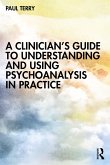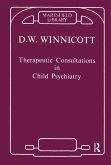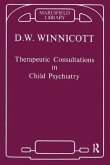- Broschiertes Buch
- Merkliste
- Auf die Merkliste
- Bewerten Bewerten
- Teilen
- Produkt teilen
- Produkterinnerung
- Produkterinnerung
D. W. Winnicott was one of the giants of child psychiatry and psychoanalysis. He argued eloquently for an increased sensitivity to children, their development and their needs.
Andere Kunden interessierten sich auch für
![The Clinic of Donald W. Winnicott The Clinic of Donald W. Winnicott]() Laura DethivilleThe Clinic of Donald W. Winnicott35,99 €
Laura DethivilleThe Clinic of Donald W. Winnicott35,99 €![A Clinician's Guide to Understanding and Using Psychoanalysis in Practice A Clinician's Guide to Understanding and Using Psychoanalysis in Practice]() Paul TerryA Clinician's Guide to Understanding and Using Psychoanalysis in Practice48,99 €
Paul TerryA Clinician's Guide to Understanding and Using Psychoanalysis in Practice48,99 €![Therapeutic Consultations in Child Psychiatry Therapeutic Consultations in Child Psychiatry]() Donald W. WinnicottTherapeutic Consultations in Child Psychiatry169,99 €
Donald W. WinnicottTherapeutic Consultations in Child Psychiatry169,99 €![The Family and Individual Development The Family and Individual Development]() D. W. WinnicottThe Family and Individual Development32,99 €
D. W. WinnicottThe Family and Individual Development32,99 €![The Elephant in the Staffroom The Elephant in the Staffroom]() Chris EyreThe Elephant in the Staffroom24,99 €
Chris EyreThe Elephant in the Staffroom24,99 €![Therapeutic Consultations in Child Psychiatry Therapeutic Consultations in Child Psychiatry]() Donald W. WinnicottTherapeutic Consultations in Child Psychiatry50,99 €
Donald W. WinnicottTherapeutic Consultations in Child Psychiatry50,99 €![The Mentalization Guidebook The Mentalization Guidebook]() Janne Oestergaard HagelquistThe Mentalization Guidebook86,99 €
Janne Oestergaard HagelquistThe Mentalization Guidebook86,99 €-
-
-
D. W. Winnicott was one of the giants of child psychiatry and psychoanalysis. He argued eloquently for an increased sensitivity to children, their development and their needs.
Hinweis: Dieser Artikel kann nur an eine deutsche Lieferadresse ausgeliefert werden.
Hinweis: Dieser Artikel kann nur an eine deutsche Lieferadresse ausgeliefert werden.
Produktdetails
- Produktdetails
- Routledge Classics
- Verlag: Taylor & Francis Ltd
- Seitenzahl: 288
- Erscheinungstermin: 5. September 2011
- Englisch
- Abmessung: 216mm x 140mm x 16mm
- Gewicht: 370g
- ISBN-13: 9780415673730
- ISBN-10: 0415673739
- Artikelnr.: 32900763
- Herstellerkennzeichnung
- Libri GmbH
- Europaallee 1
- 36244 Bad Hersfeld
- gpsr@libri.de
- Routledge Classics
- Verlag: Taylor & Francis Ltd
- Seitenzahl: 288
- Erscheinungstermin: 5. September 2011
- Englisch
- Abmessung: 216mm x 140mm x 16mm
- Gewicht: 370g
- ISBN-13: 9780415673730
- ISBN-10: 0415673739
- Artikelnr.: 32900763
- Herstellerkennzeichnung
- Libri GmbH
- Europaallee 1
- 36244 Bad Hersfeld
- gpsr@libri.de
D. W. Winnicott (1896-1971). One of the foremost child analysts of the last century, best known for his pioneering work in the field of object relations theory, known to every parent as the 'security blanket'. He worked at Paddington Green Children's Hospital in London as a paediatrician and child psychoanalyst for forty years. His works Playing and Reality and The Family and Individual Development are also available as Routledge Classics
Foreword. Editors' Preface. Winnicott, Introduction. Part I: Children Under
Stress: Wartime Experience. Editors' Introduction. Evacuation of Small
Children. Review of the Cambridge Evacuation Survey (1941). Children in the
War (1940). The Deprived Mother (1939). The Evacuated Child (1945). The
Return of the Evacuated Child (1945). Home Again (1945). Residential
Management as Treatment for Difficult Children (1947). Children's Hostels
in War and Peace (1948). Part II: The Nature and Origins of the Antisocial
Tendency. Editors' Introduction. Aggression and its Roots. The Development
of the Capacity for Concern (1963). The Absence of a Sense of Guilt (1966).
Some Psychological Aspects of Juvenile Delinquency (1946). The Antisocial
Tendency (1956). The Psychology of Separation (1958). Aggression, Guilt and
Reparation (1960). Struggling Through the Doldrums (1963). Youth Will Not
Sleep (1964). Part III: The Social Provision. Editors' Introduction.
Correspondence with a Magistrate (1944). The Foundation of Mental Health
(1951). The Deprived Child and How He Can Be Compensated for Loss of Family
Life (1950). Group Influences and the Maladjusted Child: The School Aspect
(1955). The Persecution that Wasn't (1967). Comments on the Report of the
Committee on Punishment in Prisons and Borstals (1961). Do Progressive
Schools Give Too Much Freedom to the Child? Residential Care as Therapy
(1970). Part IV: Individual Therapy. Editors' Introduction. Varieties of
Psychotherapy. The Psychotherapy of Character Disorders (1963).
Dissociation Revealed in Therapeutic Consultation (1965). Sources of the
Papers in this Volume.
Stress: Wartime Experience. Editors' Introduction. Evacuation of Small
Children. Review of the Cambridge Evacuation Survey (1941). Children in the
War (1940). The Deprived Mother (1939). The Evacuated Child (1945). The
Return of the Evacuated Child (1945). Home Again (1945). Residential
Management as Treatment for Difficult Children (1947). Children's Hostels
in War and Peace (1948). Part II: The Nature and Origins of the Antisocial
Tendency. Editors' Introduction. Aggression and its Roots. The Development
of the Capacity for Concern (1963). The Absence of a Sense of Guilt (1966).
Some Psychological Aspects of Juvenile Delinquency (1946). The Antisocial
Tendency (1956). The Psychology of Separation (1958). Aggression, Guilt and
Reparation (1960). Struggling Through the Doldrums (1963). Youth Will Not
Sleep (1964). Part III: The Social Provision. Editors' Introduction.
Correspondence with a Magistrate (1944). The Foundation of Mental Health
(1951). The Deprived Child and How He Can Be Compensated for Loss of Family
Life (1950). Group Influences and the Maladjusted Child: The School Aspect
(1955). The Persecution that Wasn't (1967). Comments on the Report of the
Committee on Punishment in Prisons and Borstals (1961). Do Progressive
Schools Give Too Much Freedom to the Child? Residential Care as Therapy
(1970). Part IV: Individual Therapy. Editors' Introduction. Varieties of
Psychotherapy. The Psychotherapy of Character Disorders (1963).
Dissociation Revealed in Therapeutic Consultation (1965). Sources of the
Papers in this Volume.
Foreword. Editors' Preface. Winnicott, Introduction. Part I: Children Under
Stress: Wartime Experience. Editors' Introduction. Evacuation of Small
Children. Review of the Cambridge Evacuation Survey (1941). Children in the
War (1940). The Deprived Mother (1939). The Evacuated Child (1945). The
Return of the Evacuated Child (1945). Home Again (1945). Residential
Management as Treatment for Difficult Children (1947). Children's Hostels
in War and Peace (1948). Part II: The Nature and Origins of the Antisocial
Tendency. Editors' Introduction. Aggression and its Roots. The Development
of the Capacity for Concern (1963). The Absence of a Sense of Guilt (1966).
Some Psychological Aspects of Juvenile Delinquency (1946). The Antisocial
Tendency (1956). The Psychology of Separation (1958). Aggression, Guilt and
Reparation (1960). Struggling Through the Doldrums (1963). Youth Will Not
Sleep (1964). Part III: The Social Provision. Editors' Introduction.
Correspondence with a Magistrate (1944). The Foundation of Mental Health
(1951). The Deprived Child and How He Can Be Compensated for Loss of Family
Life (1950). Group Influences and the Maladjusted Child: The School Aspect
(1955). The Persecution that Wasn't (1967). Comments on the Report of the
Committee on Punishment in Prisons and Borstals (1961). Do Progressive
Schools Give Too Much Freedom to the Child? Residential Care as Therapy
(1970). Part IV: Individual Therapy. Editors' Introduction. Varieties of
Psychotherapy. The Psychotherapy of Character Disorders (1963).
Dissociation Revealed in Therapeutic Consultation (1965). Sources of the
Papers in this Volume.
Stress: Wartime Experience. Editors' Introduction. Evacuation of Small
Children. Review of the Cambridge Evacuation Survey (1941). Children in the
War (1940). The Deprived Mother (1939). The Evacuated Child (1945). The
Return of the Evacuated Child (1945). Home Again (1945). Residential
Management as Treatment for Difficult Children (1947). Children's Hostels
in War and Peace (1948). Part II: The Nature and Origins of the Antisocial
Tendency. Editors' Introduction. Aggression and its Roots. The Development
of the Capacity for Concern (1963). The Absence of a Sense of Guilt (1966).
Some Psychological Aspects of Juvenile Delinquency (1946). The Antisocial
Tendency (1956). The Psychology of Separation (1958). Aggression, Guilt and
Reparation (1960). Struggling Through the Doldrums (1963). Youth Will Not
Sleep (1964). Part III: The Social Provision. Editors' Introduction.
Correspondence with a Magistrate (1944). The Foundation of Mental Health
(1951). The Deprived Child and How He Can Be Compensated for Loss of Family
Life (1950). Group Influences and the Maladjusted Child: The School Aspect
(1955). The Persecution that Wasn't (1967). Comments on the Report of the
Committee on Punishment in Prisons and Borstals (1961). Do Progressive
Schools Give Too Much Freedom to the Child? Residential Care as Therapy
(1970). Part IV: Individual Therapy. Editors' Introduction. Varieties of
Psychotherapy. The Psychotherapy of Character Disorders (1963).
Dissociation Revealed in Therapeutic Consultation (1965). Sources of the
Papers in this Volume.








